TOGETHER IN ASIA TO LEARN ABOUT THE PAST, TO CELEBRATE THE PRESENT AND TO PEER INTO THE FUTURE, TO RE-MOTIVATE THE CAMILLIAN MISSIONARY SPIRIT
Meeting of the Superior General, the members of the General Consulta and the major Superiors in Taiwan
Loudong, 18-22 June 2018
The meeting of the major Superiors of the Order with the Superior General and the members of the General Consulta began today, 18 June 2018, in Loudong (Taiwan).
We would like to thank at the outset the Camillian Delegation of Taiwan for the splendid efforts at the level of organisation they have made to 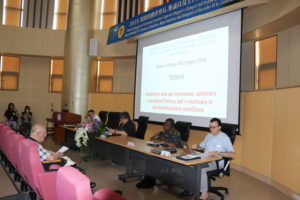 achieve in a warm and effective way the welcoming of all the religious who come from four continents of the world.
achieve in a warm and effective way the welcoming of all the religious who come from four continents of the world.
Our meeting was preceded (on Sunday 17 June 2018) by the solemn celebration, charged with strong emotions, of the funeral of Fr. Antonio Didonè, a Camillian religious who spent fifty-three years of his Camillian consecration in Taiwan: he was a Camillian religious, a priest, a medical doctor specialised in paediatrics…He died on Wednesday 13 June of this year after ten years of an illness that blocked and immobilised his body and the whole of his creative impetus of charity towards the poor, the autochthonous people, and the sick whom he loved, served and healed with passion and skill.
We are guests in the new and comfortable building dedicated to ‘Br. Renato Marinello’ but remain within the compound of St. Mary’s Hospital: Br. Marinello was a Camillian religious who spent most of his religious life at the service of the sick and the poor of Taiwan.
We were introduced to the ‘spirit’ of the country that is hosting us by the traditional dances and songs by a group of autochthonous Taiwanese.
The warm greetings of the general director of St. Mary’s Hospital and of Fr. Jojo Eloja – the Provincial Superior of the Camillian Province of the Philippines – officially inaugurated our meeting.
Fr. Leocir Pessini presented the goals of our meeting: the hope is that it will be a moment to learn about our past in China and to offer up thanks at the same time as the anniversary of the arrival of the Camillians in China (Taiwan) sixty years ago:
- To explore the various social, cultural and religious aspects of this region of Asia.
- To address some special dimensions of Buddhism and its relationship with the Church.
- To foster exchange and fraternity amongst those taking part (the whole of the day of 19 June) in order to assess the potentialities of the presence of the Camillians in Asia (on 19 June 2018 all the Camillian representatives of Asia (India, Thailand, the Philippines and Vietnam) and Indonesia, inviting Fr. Luigi Galvani or others, will be invited to present their perspectives on the realities, the challenges and the prospects for the future of the Camillians. Following this there will be an opportunity for an exchange of opinions and strategies.
- To share internal communications about the Order (exchanges about the initiatives of individual Provinces) and the different areas of responsibility of the General Consulta (financial administration, formation, secretariat, ministry).
- To present the physiognomy of the Vice-Province of Benin-Togo as we look forward to it acquiring the status of a Province (probably in September 2018).
- To assess the efficacy of the document on inter-Provincial cooperation, given that the sending of Camillian religious ‘towards Europe’ continues to take place and that it is not always the case that the agreements between the Province that sends and the Province that receives, or simply the Province that hosts the religious in its own area (in this case the religious who are sent work with a diocese), are clear. Indeed, at times they are a source of misunderstanding.
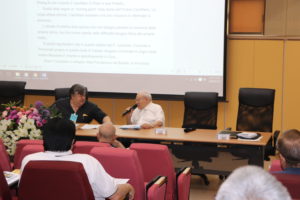 Fr. Pessini then began his talk with a broad introduction entitled ‘Some Introductory Notes on Ethical, Socio-Cultural, Historical and Asian Religions from China’ (see attachment). In his introductory talk he went over the most important historical stages of the arrival of the Camillians in China and the development of our charism in the continent of Asia.
Fr. Pessini then began his talk with a broad introduction entitled ‘Some Introductory Notes on Ethical, Socio-Cultural, Historical and Asian Religions from China’ (see attachment). In his introductory talk he went over the most important historical stages of the arrival of the Camillians in China and the development of our charism in the continent of Asia.
He emphasised the profound role of the great religions in the Asian context (Hinduism, Buddhism, Confucianism, Taoism) and the influence that they have on the spiritual life of people in the Eastern and Asian world in particular.
He ended with the presentation of some international appointments of the Order: the meeting of the Lay Camillian Family (Rome, October 2018); the meeting of the representatives of ‘our works’ (San Paolo, Brazil, October 2019); the meeting of the Camillian charismatic family – the men Camillians, the Daughters of St. Camillus, the women Ministers of the Sick, the Handmaidens of the Incarnation, the women Missionaries of the Sick ‘Christ the Hope’, Stella Maris, and Camilianische Schwestern (Rome, March 2019).
Fr. Giovanni Rizzi – a Camillian missionary aged ninety-two who has been in Taiwan for over fifty years – described in an informed and expert way, and with passion, the history and the motivations of the Camillian presence in China ever since the early beginnings of the great Camillian missionary epopee in China: the ship left Taranto on 1 April 1946 and reached Shanghai on the following 10 May (cf. La Cina ha bisogno di un Buon Samaritano attached). There emerged from this an extraordinary array of Camillians who were impassioned about their mission in China, in particular religious from the Camillian Province of Lombardy and Veneto: Fr. Alessandro Pedroni, Fr. Florindo Rubini, Fr. Antonio Crotti, Fr. Celestino Rizzi (who died on 13 September 1951 in Cina-Yunnan at the age of only thirty-three), Fr. Angelo Pastro, Fr. Ernesto Valdesolo, Br. Marcello Caon, Br. Umberto Amici, Fr. Aldo Antonelli, Fr. Gino Melato, Br. Remo Casagrande, Br. Davide Giordan…as well as ‘great men of the Church’ like Msgr. Kerech, women Ministers of the Sick, and Samaritan lay people such as Dr. Janez.
Ling-Y-Huei (Association for Caring for Souls and Bodies) was the name that the Camillians adopted for themselves in Chinese. In only five years they built a religious house (1947), took responsibility for the local leper hospital (1948), and built the local Catholic church, a dispensary and a clinic (1950). Unfortunately in 1952 all of the European missionaries were expelled from China by the Communists. This was the painful event that offered the Camillian missionaries the opportunity to move to a missionary role in Thailand (Bang Pong) and the island of Formosa-Taiwan, with at a specific level a group in the area of the Pescadores Island (Makung) and a group of religious in Lotung. It was at that moment that there began the creative and committed activity of the Camillians: St. Mary’s Hospital, activity for poor sick people, for people with handicaps, for elderly people on their own, for patients in sanatoria, the evangelisation of the district of Loutan, and parish activities for the autochthonous people.
The afternoon was dedicated to a further analysis of the state of the Church in the context of China and of Taiwan in particular. Fr. Mbwi Khohi, a Congolese priest who has lived in Taiwan for about thirty years and is at the present time the director of the Pontifical Missionary Works of Taiwan, gave a paper on the ‘State of the Church in Taiwan’ through a series of interviews recorded on videos in which religious and priests of various nationalities spoke about their personal experience of faith and evangelisation in Taiwan. All of them emphasised that they worked as Christians in a context in which few Catholics live (1% of the population are Catholics and they are organised into seven dioceses. At the present time Taiwan has 23,690,000 inhabitants) and where a major effort at evangelisation still has to be undertaken. This is a matter of acting above all with young people who are often uprooted from their families and it is matter of acting in the area of families who in Taiwan have very high divorce rates. New synergies between all of the priests and religious who live in Taiwan should be achieved (most of the priests who live and work in Taiwan do not come from the country – they come from other countries of the world and are engaging in a missionary experience). Despite these challenges, there are very many human, cultural and spiritual elements that nourish our faith and our hope, starting with a ‘smile’, which, indeed, is a specific characteristic of Taiwanese children and young people.
After this paper a Jesuit religious, Fr. Louis Gendron, gave a paper on the subject ‘Foreign Missionaries in Taiwan’. The presence of Catholic missionaries in Taiwan began in an organised way after 1948, the year of the expulsion of foreign religious from mainland China by the Communists. At the present time, 60% of the clergy who are in Taiwan are foreigners. However, from 1960 until today the ethnic composition of the missionaries has changed: today they no longer come from Europe and North America but from Vietnam, the Philippines and Korea. Despite the great efforts made to promote evangelisation, the number of Catholics has not grown and has levelled off at 240,000 people – 20% less than fifty years ago. Catechists encounter many problems in meeting new catechumens to whom to provide formation and offer preparation for baptism. The only Catholic faculty of theology, in Taipei, has a faculty for the studies of lay people involved in this great task of the proclaiming of the Gospel.
The Catholic Church has a major impact on the social fabric of Taiwan: schools with about 140,000 students, hospitals, homes and institutions for elderly people and handicapped people (a service offered to 40,000 people). The initiatives of Catholics are very much appreciated at a social and cultural level: these institutions are well identified with the spirit of Catholic values and their promotion. The Church’s experience in Taiwan is a very rich one and is also open to the Church of mainland China: every year about forty priests from mainland Chin arrive in Taiwan to be able to deepen their studies and their theological and spiritual formation. The principal aptitude of the missionaries in Taiwan is to be take care of the person in his or her totality: the offer of education, health. Inculturation by foreign missionaries is deep: almost all of them have leant Chinese – Mandarin – and the language of Taiwan, as a sign of an initial readiness to immerse themselves in a radical way in the culture of the local people.
The day ended with the celebration of the Eucharist presided over by His Excellency Msgr. John Hung Shan-Chuan S.V.D, the Archbishop of Taipei.



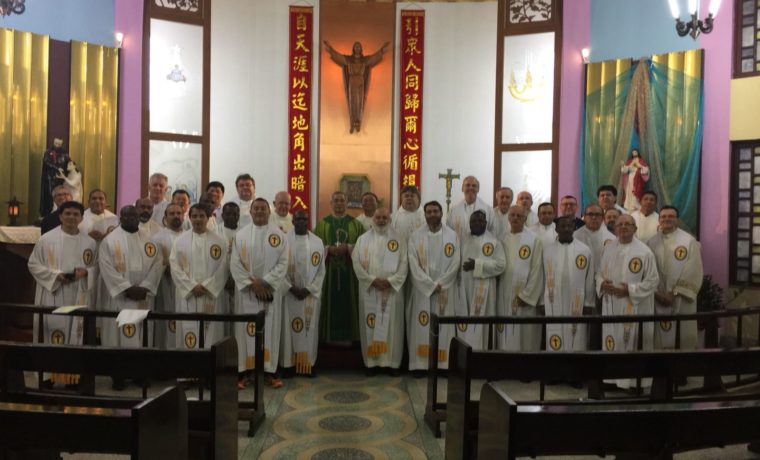
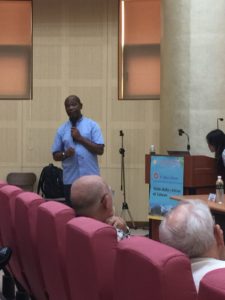
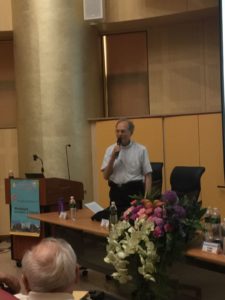









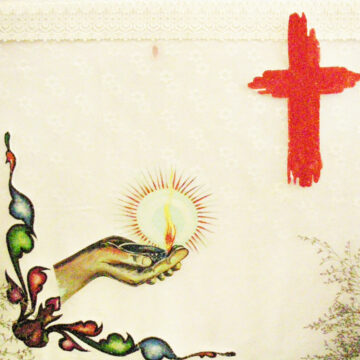
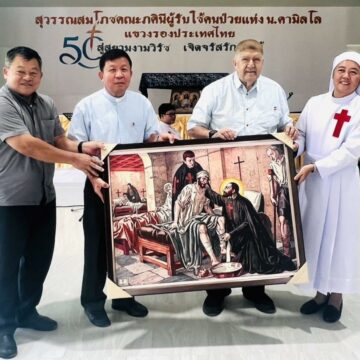
Camillians on Facebook
Camillians on Twitter
Camillians on Instagram